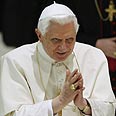
Pope's preacher: Abuse accusations akin to anti-Semitism
Rev. Raniero Cantalamessa gives Good Friday service, says abuse cover-up allegations against pontiff were like the 'more shameful aspects of anti-Semitism.' Ensuing criticism has Vatican distance pope from preacher's remarks
At a solemn Good Friday service, Pope Benedict XVI's personal preacher, Reverend Raniero Cantalamessa, likened the tide of allegations that the pontiff covered up sex abuse cases to the "more shameful aspects of anti-Semitism." But within hours, facing a storm of criticism at the comparison, the Vatican felt it necessary to distance the pope from the preacher's remarks.
Victims say Benedict — both as a former archbishop of Munich and later as a Vatican cardinal directing the Holy See's policy on handling abuse cases — was part of a culture of cover-up and confidentiality basically devised to protect church hierarchy.
Both Jewish and victims' groups said that it was inappropriate to compare the discomfort being experienced by the church leadership in the sex abuse scandal to the violence that culminated in the Holocaust.
The Vatican has been on the defensive in recent days, saying the church has been singled out and collectively stereotyped for the problem of pedophilia, which it says is a society-wide issue.
Invoking any comparison with anti-Semitism was particularly sensitive on Good Friday, itself a delicate day in a decades-long effort by Jews and Catholics to overcome a legacy of mistrust. There was a long-held Catholic belief that Jews were collectively responsible for executing Christ, and a landmark achievement of the Second Vatican Council of the 1960s was a declaration stating the Jews should not be blamed for the crucifixion.
'Not the Vatican's position'
Cantalamessa, in his reflections for the pope on the Catholic church's most solemn day, said he was inspired by a letter from an unidentified Jewish friend who was upset by the "attacks" against Benedict.
Jews "know from experience what it means to be victims of collective violence and also because of this they are quick to recognize the recurring symptoms," said Cantalamessa, a Franciscan priest.
Quoting from the letter, Cantalamessa said his Jewish friend was following "with indignation the violent and concentric attacks against the church, the pope and all the faithful of the whole world."
"The use of stereotypes, the passing from personal responsibility and guilt to a collective guilt remind me of the more shameful aspects of anti-Semitism," he said, quoting from the letter.
The Rev. Federico Lombardi, a Vatican spokesman, later contacted The Associated Press and said Cantalamessa wasn't speaking as a Vatican official when he compared "attacks'" on the pope to "collective" violence against Jews.
Such parallelism can "lead to misunderstandings and is not an official position of the Catholic Church," Lombardi said, adding that Cantalamessa was speaking about a letter from a friend who lived through a "painful experience."
Although the Vatican said Cantalamessa wasn't speaking as an official of the Holy See, its official daily newspaper L'Osservatore Romano ran the text of the homily in full.
'Unheard-of insolence'
Cantalamessa's remarks angered various Jewish leaders: "Shame on Father Cantalamessa," said Elan Steinberg, vice president of the American Gathering of Holocaust Survivors and their Descendants, in a statement. "The Vatican is entitled to defend itself, but the comparison with anti-Semitic persecution is offensive and unsustainable. We are sorely disappointed."
Rabbi Gary Greenebaum, who said he recently had "cordial" talks at the Vatican with church and other Jewish leaders as part of efforts on both sides to improve Catholic-Jewish relations, sounded dismayed.
"It's an unfortunate use of language to make this comparison, since the collective violence against the Jews resulted in the death of 6 million, while the collective violence spoken of here has not led to murder and destruction, but perhaps character assault," said Greenebaum, U.S. director of interreligious relations for the American Jewish Committee.
German Jewish leader Stephan Kramer described Cantalamessa's remarks as "unheard-of insolence."
"It is repulsive, obscene and most of all offensive toward all abuse victims as well as to all the victims of the Holocaust," said Kramer, general secretary of Germany's Central Council of Jews, in an interview with the AP in Berlin.










